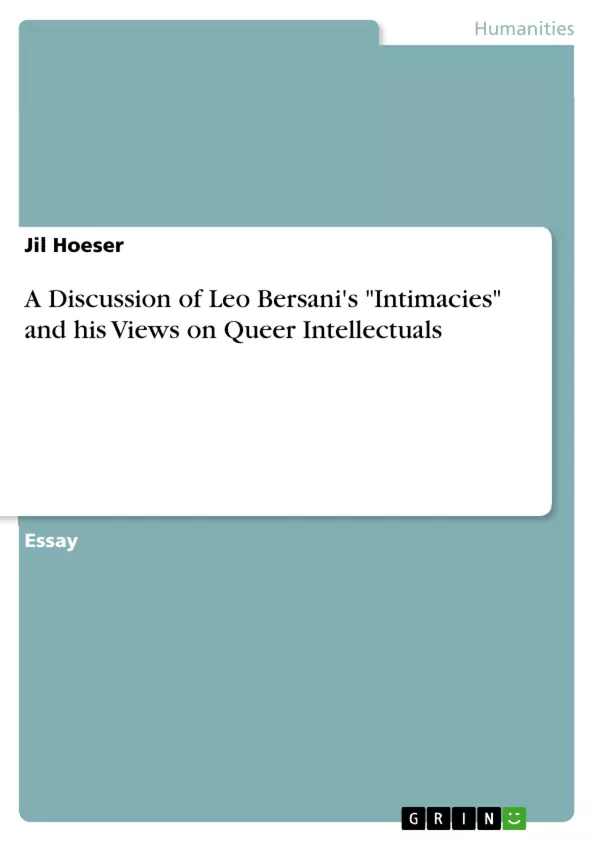Leo Bersani, a renowned professor in the French Department at the University of California Berkley, is widely seen as a psychoanalytically engaged writer. In collaboration with his friend Adam Phillips, he wrote a dialogue and interview between the two of them called Intimacies in 2008.
Bersanis’ book is as complex and interesting as one could expect. To put it in a nutshell, he accuses queer theorists not to live their lives like they want you to do it in their own writings. In the following paragraphs I will try to briefly explain what queer theory is about in order to make an analyse of Bersanis’ point of view about queer intellectuals.
Inhaltsverzeichnis (Table of Contents)
- Introduction
- Queer Theory
- Bersani's Critique of Queer Intellectuals
- Examples and Illustrations
- Conclusion
Zielsetzung und Themenschwerpunkte (Objectives and Key Themes)
This essay examines Leo Bersani's critique of queer intellectuals, arguing that they are “curiously reticent about the sexuality they claim to celebrate.” The essay explores Bersani's view by examining his book, *Intimacies*, and analyzing the development of queer theory and its main tenets.
- Bersani's critique of queer intellectuals
- The development of queer theory
- The relationship between sexuality and identity
- The politics of representation and anti-normativity
- The impact of language and the resignification of pejorative terms
Zusammenfassung der Kapitel (Chapter Summaries)
- The essay begins by introducing Leo Bersani's critique of queer intellectuals and their apparent reticence to fully embrace the sexuality they advocate for. It highlights Bersani's psychoanalytic approach to the subject and emphasizes the complexity of his work as evident in reviews by Panter and Morgan.
- The second chapter provides a concise overview of queer theory, tracing its origins and key concepts. It explains how queer theory challenges traditional categories of sexual and gender identity and aims to deconstruct normative assumptions.
- The third chapter delves into Bersani's critique of queer theorists, focusing on their alleged hypocrisy and the disconnect between their writing and personal practices. It explores how some of the key figures in queer theory, such as Judith Butler and Michael Warner, have distanced themselves from their earlier work, implying a change in their perspectives. This chapter also examines Bersani's observations about the silence surrounding gay sex within queer intellectual circles and the paradoxical use of the term “queer” as a self-identification.
- The fourth chapter presents examples and illustrations that support Bersani's critique. It highlights the tensions between theoretical claims and actual practices within the queer community and explores the challenges associated with the resignification of pejorative terms.
Schlüsselwörter (Keywords)
The essay focuses on the concepts of queer theory, sexuality, identity, anti-normativity, representation, and the politics of language. It explores the critiques of queer intellectuals and their relationship to their own theoretical framework. Key figures discussed include Leo Bersani, Judith Butler, Michael Warner, and Michel Foucault. The essay also examines the resignification of pejorative terms such as “queer” and “dyke” and their implications for social change.
Frequently Asked Questions
What is Leo Bersani's main critique of queer intellectuals?
Bersani argues that queer theorists are "curiously reticent" about the actual sexuality and sexual practices they claim to celebrate in their writings.
What is the book "Intimacies" about?
Written by Leo Bersani and Adam Phillips in 2008, it is a complex dialogue exploring psychoanalysis, sexuality, and the nature of human connections.
How does Bersani view the term "queer" as a self-identification?
He examines the paradoxical use of the term and the tensions involved in the resignification of what was originally a pejorative term.
Which famous queer theorists are discussed in the essay?
The essay references thinkers like Judith Butler, Michael Warner, and Michel Foucault in the context of Bersani's analysis.
What is the relationship between sexuality and identity in queer theory?
Queer theory challenges traditional, fixed categories of identity, aiming to deconstruct normative assumptions about gender and sexual orientation.
What is "anti-normativity" in this context?
It refers to the political and theoretical stance of resisting and deconstructing social norms that marginalize non-traditional sexualities and identities.
- Quote paper
- Jil Hoeser (Author), 2015, A Discussion of Leo Bersani's "Intimacies" and his Views on Queer Intellectuals, Munich, GRIN Verlag, https://www.grin.com/document/313725



